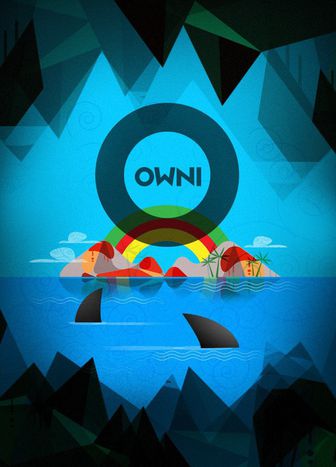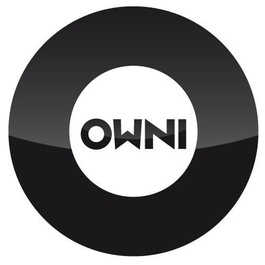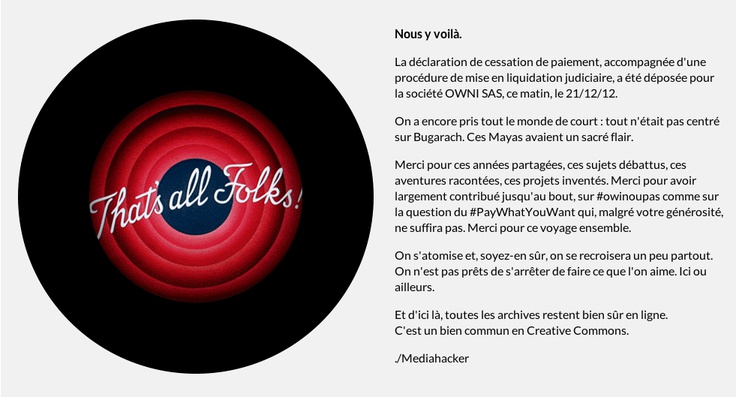
Profile: Owni, legendary French online data journalism giant
Published on
Translation by:
Cafebabel ENG (NS)After Owni (pronounced ‘ovnii’) closed down on 21 December 2012, one of its former journalists, Sylvain Lapoix, explains what the Paris-based brand meant during its three years of existence on the French media landscape
Upon its launch in March 2009, Owni – aptly, the French word for ‘UFO’ - came to be known as many things: a ‘laboratory for digital ideas’, a ‘tachycardic pure player’, an NGO, a group of mates, a liberal-libertarian model, a militant media, an outpost of digital cultures, a fanzine... Sylvain Lapoix, who has worked at the French magazine the weekly French magazine Marianne 2, was hired by the media in September 2010, at a time when the digital publication wanted to broaden its competences. He resigned in late November 2012 he resigned, as the board had decided to keep the magazine in its digital phase. One month later the magazine was bought off. Interview*.
cafebabel.com: Sylvain, what did Owni initially set out to be?
 Sylvain Lapoix: At the beginning Owni grew out of the agency 22 mars (‘22 March’). The media form was a bit bastardised – it was a mix of social network-cum-participatory media, and editorially it was launched as a reaction to Hadopi, the 2009 ‘creation and internet’ law in France. Nicolas Kayser-Bril then got on board; he was one of the precursors of data journalism in this country.
Sylvain Lapoix: At the beginning Owni grew out of the agency 22 mars (‘22 March’). The media form was a bit bastardised – it was a mix of social network-cum-participatory media, and editorially it was launched as a reaction to Hadopi, the 2009 ‘creation and internet’ law in France. Nicolas Kayser-Bril then got on board; he was one of the precursors of data journalism in this country.
cafebabel.com: What did your job at Owni entail?
Sylvain Lapoix: I wanted to talk about the political subjects which no-one was talking about, so my first special edition was about the not-so-successful privatisation of the pension reforms in France. My second attempt was a fracking investigation; it drew a huge audience to Owni from many collectives. We produced a map an interactive application where you andcould recreate the methods of hydraulic fracking from the information that we gleaned from geo-engineering manuals, and we published interviews with geological engineers. We automatically became the media of reference after that.
cafebabel.com: Owni’s other huge scoop was arguably its collaboration with WikiLeaks...
Sylvain Lapoix:Julian Assange contacted the team after we had created the interface allowing us to access telegrams. He was the one who wanted to start a collaboration and discuss potential publication conditions. It was about a well-thought out process of merging the readers with the journalists, of opening up a collaboration between them. It was a form of datajournalism, and that’s what got us noticed on the pan-European level.
cafebabel.com: So what does data journalism mean in France?
Sylvain Lapoix: It’s journalism using different methods. A data journalist will work with tools which will help he or she restructure, treat and restore information to his or her reader in a more immersive way – it is more interactive, and thus more pedagogical.
cafebabel.com: What are the best data journalism medias in the world?
Sylvain Lapoix: In Europe it’s The Guardian and The Economist (UK), Il Sole 24 Ore (Italy) and Die Welt (Germany). In the US it's The Wall Street Journal, The New York Times, The Seattle Times and The Washington Post.
cafebabel.com: There are no ‘pure players’ in that list…
Sylvain Lapoix: It’s really important to distinguish Owni from that point of view. One of the real problems that data journalism has is its business model – or its lack thereof. From an economic perspective, it’s extremely expensive since it’s quite rare to find a data journalist with all his or her competences.
cafebabel.com: Is data journalism indispensable to the media landscape?
Sylvain Lapoix: No. Of course it’s a tool which has a fantastic power. But in the context of the current economic crisis, doing data journalism isn’t really profitable. You would probably be mobilising an entire team of expensive data journalists with the right competences but in the end they would probably only be producing one sole article over a few weeks.
cafebabel.com: So what could be the best model for data journalism?
Sylvain Lapoix: We haven’t found it yet! At one point we wanted to make the media more autonomous by selling applications, e-books and the like, but it didn’t work. The e-book market hasn’t matured yet, the apps market is still in development and so we couldn’t really draw the necessary margins to keep an editorial team making bread from it.
cafebabel.com: Does the demise of Owni correctly illustrate that an information website running without subscriptions or advertising cannot survive ?
Sylvain Lapoix: It shows that even in the context of capitalist frenzy, where investors are rushing to buy up the latest ‘sensation’, a media does not represent enough of a value on the market to bid upon – at least when it comes to start-ups and economic models.
'The ‘bunch of mates’ element of it probably didn’t help it in the end – we paid the price for our model'
cafebabel.com: Did Owni have weaknesses, or is it all down to bad timing?
Owni was a laboratory of journalistic research and development as much in the articles it published as in how it worked. The ‘bunch of mates’ element of it probably didn’t help it in the end – we paid the price for our model. I am sad because it all went badly; Owni had the guts to propose alternative, incongruous subjects and the freedom of publishing articles in a different way.
*This interview was conducted before Owni declared bankruptcy in December 2012
Images: main and in-text: courtesy of © Owni facebook page; 'That's all folks' screen capture (cc) Owni official site/ video (cc) Scarblicitus/ ouTube
Translated from Owni soit-il : « faire du datajournalisme n'est pas indispensable »



